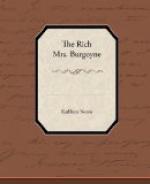“Wayne Adams; nice people, with two nice boys,” he supplied; “but she’s like the rest. Wayne lies awake nights worrying about bills, and she gives silver photograph-frames for bridge prizes. That white stucco house where they’re putting in an Italian garden, is the Parker Lloyds. Mrs. Lloyd’s a clever woman, and pretty too; but she doesn’t seem to have any sense. They’ve got a little girl, and she’ll tell you that Mabel never wore a stitch that wasn’t hand-made in her life. Lloyd had a nervous breakdown a few months ago—we all knew it was nothing but money worry—but yesterday his wife said to me in all good faith that he was too unselfish, he was wearing himself out. She was trying to persuade him to put Mabel in school and go abroad for a good rest.”
Mrs. Burgoyne laughed.
“That’s like Jeanette Carew showing me her birthday present,” Barry went on with a grin. “It seems that George gave her a complete set of bureau ivory—two or three dozen pieces in all, I guess. When I asked her she admitted that she had silver, but she said she wanted ivory, everybody has ivory now. Present!” he repeated with scorn, “why, she just told George what she wanted, and went down and charged it to him! She’s worried to death about bills now, but she started right in talking motor-cars; and they’ll have one yet. I’d give a good deal,” he finished disgustedly, “to know what they get out of it.”
“I don’t believe they’re as bad as all that,” said the lady. “There used to be some lovely people here, and there was a whist club too, and it was very nice. They played for a silver fork and spoon every fortnight, and I remember that Mrs. Holly had nearly a dozen of the forks. There was a darling Mrs. Apostleman, and Mrs. Pratt with two shy pretty daughters—”
“Mrs. Apostleman’s still here,” he told her. “She’s a fine old lady. When a woman gets to be sixty, it doesn’t seem to matter if she wastes time. Mrs. Pratt is dead, and Lizzie is married and lives in San Francisco, but Anne’s still here. She and her brother live in that vault of a gray house; you can see the chimneys. Anne’s another, “his tone was cynical again, “a shy, nervous woman, always getting new dresses, and always on club reception committees, with white gloves and a ribbon in her hair, frightened to death for fear she’s not doing the correct thing. They’ve just had a frieze of English tapestries put in the drawing-room and hall,—English tapestries!”
“Perhaps you don’t appreciate tapestries,” said Mrs. Burgoyne, with her twinkling smile. “You know there is a popular theory that such things keep money in circulation.”
“You know there’s hardly any form of foolishness or vice of which you can’t say that,” he reminded her soberly; and Mrs. Burgoyne, serious in turn, answered quickly:
“Yes, you’re quite right. It’s too bad; we American women seem somehow to have let go of everything real, in the last few generations. But things are coming around again.” She rose from the steps, still facing the village. “Tell me, who is my nearest neighbor there, in the white cottage?” she demanded.




